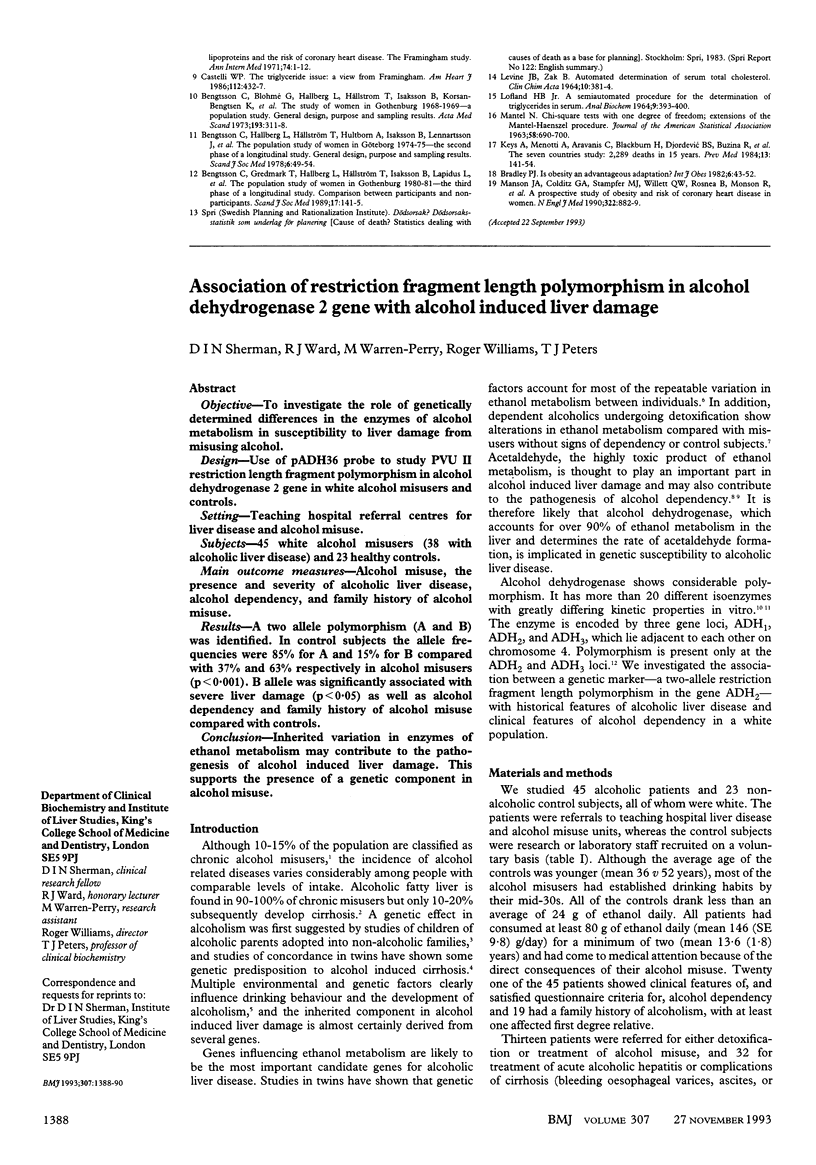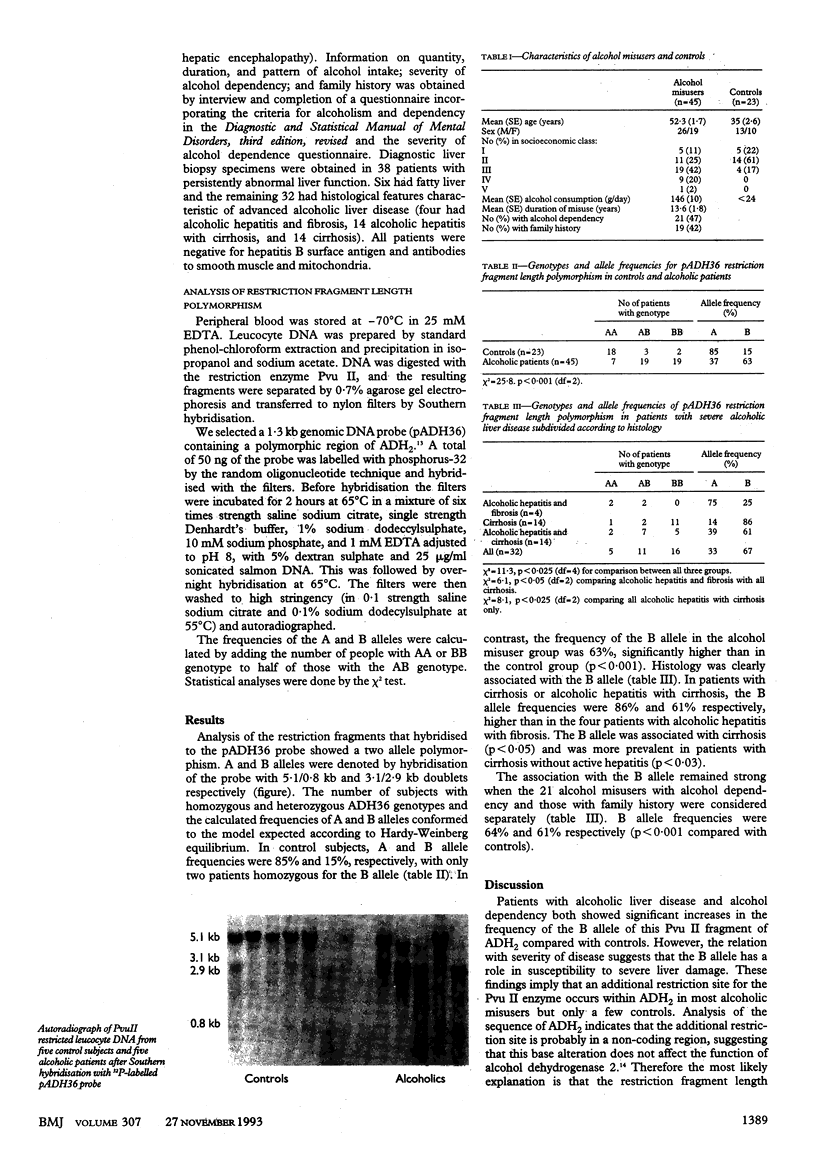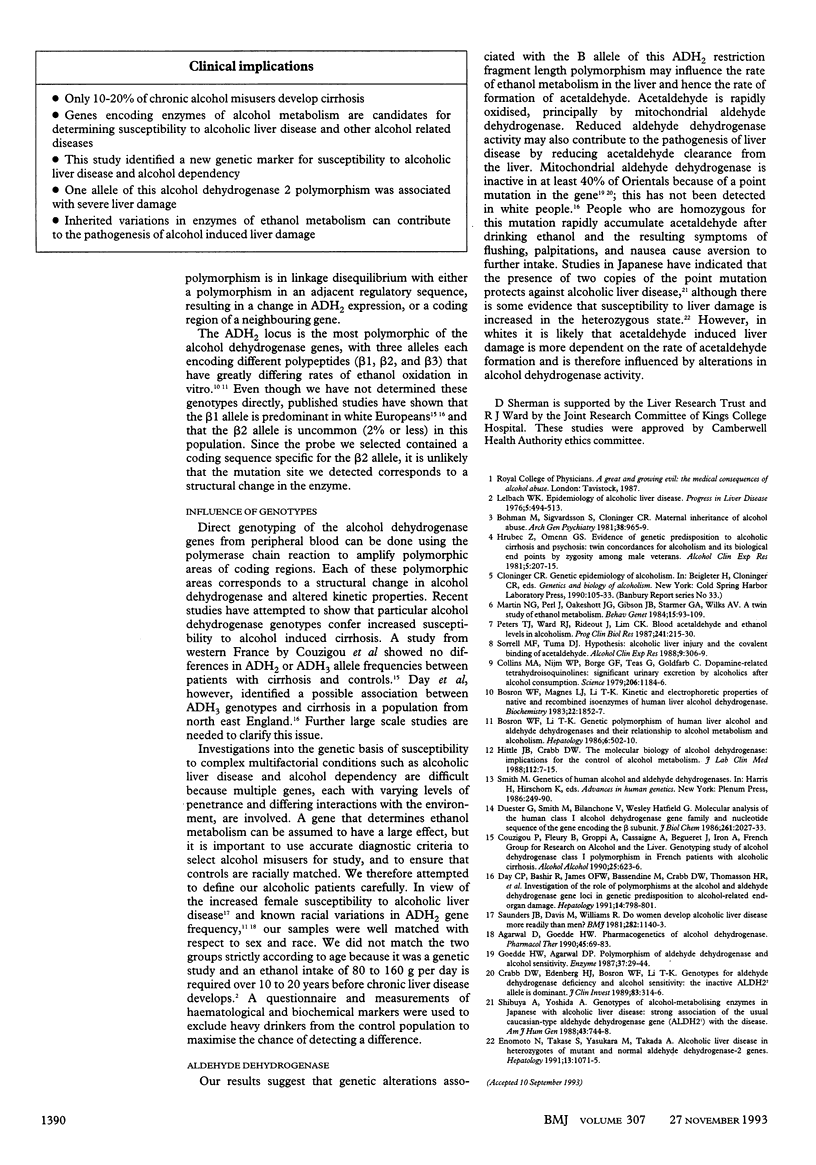Abstract
OBJECTIVE--To investigate the role of genetically determined differences in the enzymes of alcohol metabolism in susceptibility to liver damage from misusing alcohol. DESIGN--Use of pADH36 probe to study PVU II restriction length fragment polymorphism in alcohol dehydrogenase 2 gene in white alcohol misusers and controls. SETTING--Teaching hospital referral centres for liver disease and alcohol misuse. SUBJECTS--45 white alcohol misusers (38 with alcoholic liver disease) and 23 healthy controls. MAIN OUTCOME MEASURES--Alcohol misuse, the presence and severity of alcoholic liver disease, alcohol dependency, and family history of alcohol misuse. RESULTS--A two allele polymorphism (A and B) was identified. In control subjects the allele frequencies were 85% for A and 15% for B compared with 37% and 63% respectively in alcohol misusers (p < 0.001). B allele was significantly associated with severe liver damage (p < 0.05) as well as alcohol dependency and family history of alcohol misuse compared with controls. CONCLUSION--Inherited variation in enzymes of ethanol metabolism may contribute to the pathogenesis of alcohol induced liver damage. This supports the presence of a genetic component in alcohol misuse.
Full text
PDF


Images in this article
Selected References
These references are in PubMed. This may not be the complete list of references from this article.
- Agarwal D. P., Goedde H. W. Pharmacogenetics of alcohol dehydrogenase (ADH). Pharmacol Ther. 1990;45(1):69–83. doi: 10.1016/0163-7258(90)90008-p. [DOI] [PubMed] [Google Scholar]
- Bohman M., Sigvardsson S., Cloninger C. R. Maternal inheritance of alcohol abuse. Cross-fostering analysis of adopted women. Arch Gen Psychiatry. 1981 Sep;38(9):965–969. doi: 10.1001/archpsyc.1981.01780340017001. [DOI] [PubMed] [Google Scholar]
- Bosron W. F., Li T. K. Genetic polymorphism of human liver alcohol and aldehyde dehydrogenases, and their relationship to alcohol metabolism and alcoholism. Hepatology. 1986 May-Jun;6(3):502–510. doi: 10.1002/hep.1840060330. [DOI] [PubMed] [Google Scholar]
- Bosron W. F., Magnes L. J., Li T. K. Kinetic and electrophoretic properties of native and recombined isoenzymes of human liver alcohol dehydrogenase. Biochemistry. 1983 Apr 12;22(8):1852–1857. doi: 10.1021/bi00277a017. [DOI] [PubMed] [Google Scholar]
- Couzigou P., Fleury B., Groppi A., Cassaigne A., Begueret J., Iron A. Genotyping study of alcohol dehydrogenase class I polymorphism in French patients with alcoholic cirrhosis. The French Group for Research on Alcohol and Liver. Alcohol Alcohol. 1990;25(6):623–626. doi: 10.1093/oxfordjournals.alcalc.a045058. [DOI] [PubMed] [Google Scholar]
- Crabb D. W., Edenberg H. J., Bosron W. F., Li T. K. Genotypes for aldehyde dehydrogenase deficiency and alcohol sensitivity. The inactive ALDH2(2) allele is dominant. J Clin Invest. 1989 Jan;83(1):314–316. doi: 10.1172/JCI113875. [DOI] [PMC free article] [PubMed] [Google Scholar]
- Day C. P., Bashir R., James O. F., Bassendine M. F., Crabb D. W., Thomasson H. R., Li T. K., Edenberg H. J. Investigation of the role of polymorphisms at the alcohol and aldehyde dehydrogenase loci in genetic predisposition to alcohol-related end-organ damage. Hepatology. 1991 Nov;14(5):798–801. doi: 10.1002/hep.1840140509. [DOI] [PubMed] [Google Scholar]
- Duester G., Smith M., Bilanchone V., Hatfield G. W. Molecular analysis of the human class I alcohol dehydrogenase gene family and nucleotide sequence of the gene encoding the beta subunit. J Biol Chem. 1986 Feb 15;261(5):2027–2033. [PubMed] [Google Scholar]
- Enomoto N., Takase S., Takada N., Takada A. Alcoholic liver disease in heterozygotes of mutant and normal aldehyde dehydrogenase-2 genes. Hepatology. 1991 Jun;13(6):1071–1075. [PubMed] [Google Scholar]
- Goedde H. W., Agarwal D. P. Polymorphism of aldehyde dehydrogenase and alcohol sensitivity. Enzyme. 1987;37(1-2):29–44. doi: 10.1159/000469239. [DOI] [PubMed] [Google Scholar]
- Hittle J. B., Crabb D. W. The molecular biology of alcohol dehydrogenase: implications for the control of alcohol metabolism. J Lab Clin Med. 1988 Jul;112(1):7–15. [PubMed] [Google Scholar]
- Hrubec Z., Omenn G. S. Evidence of genetic predisposition to alcoholic cirrhosis and psychosis: twin concordances for alcoholism and its biological end points by zygosity among male veterans. Alcohol Clin Exp Res. 1981 Spring;5(2):207–215. doi: 10.1111/j.1530-0277.1981.tb04890.x. [DOI] [PubMed] [Google Scholar]
- Lelbach W. K. Epidemiology of alcoholic liver disease. Prog Liver Dis. 1976;5:494–515. [PubMed] [Google Scholar]
- Martin N. G., Perl J., Oakeshott J. G., Gibson J. B., Starmer G. A., Wilks A. V. A twin study of ethanol metabolism. Behav Genet. 1985 Mar;15(2):93–109. doi: 10.1007/BF01065891. [DOI] [PubMed] [Google Scholar]
- Peters T. J., Ward R. J., Rideout J., Lim C. K. Blood acetaldehyde and ethanol levels in alcoholism. Prog Clin Biol Res. 1987;241:215–230. [PubMed] [Google Scholar]
- Shibuya A., Yoshida A. Genotypes of alcohol-metabolizing enzymes in Japanese with alcohol liver diseases: a strong association of the usual Caucasian-type aldehyde dehydrogenase gene (ALDH1(2)) with the disease. Am J Hum Genet. 1988 Nov;43(5):744–748. [PMC free article] [PubMed] [Google Scholar]
- Sorrell M. F., Tuma D. J. Hypothesis: alcoholic liver injury and the covalent binding of acetaldehyde. Alcohol Clin Exp Res. 1985 Jul-Aug;9(4):306–309. doi: 10.1111/j.1530-0277.1985.tb05549.x. [DOI] [PubMed] [Google Scholar]



